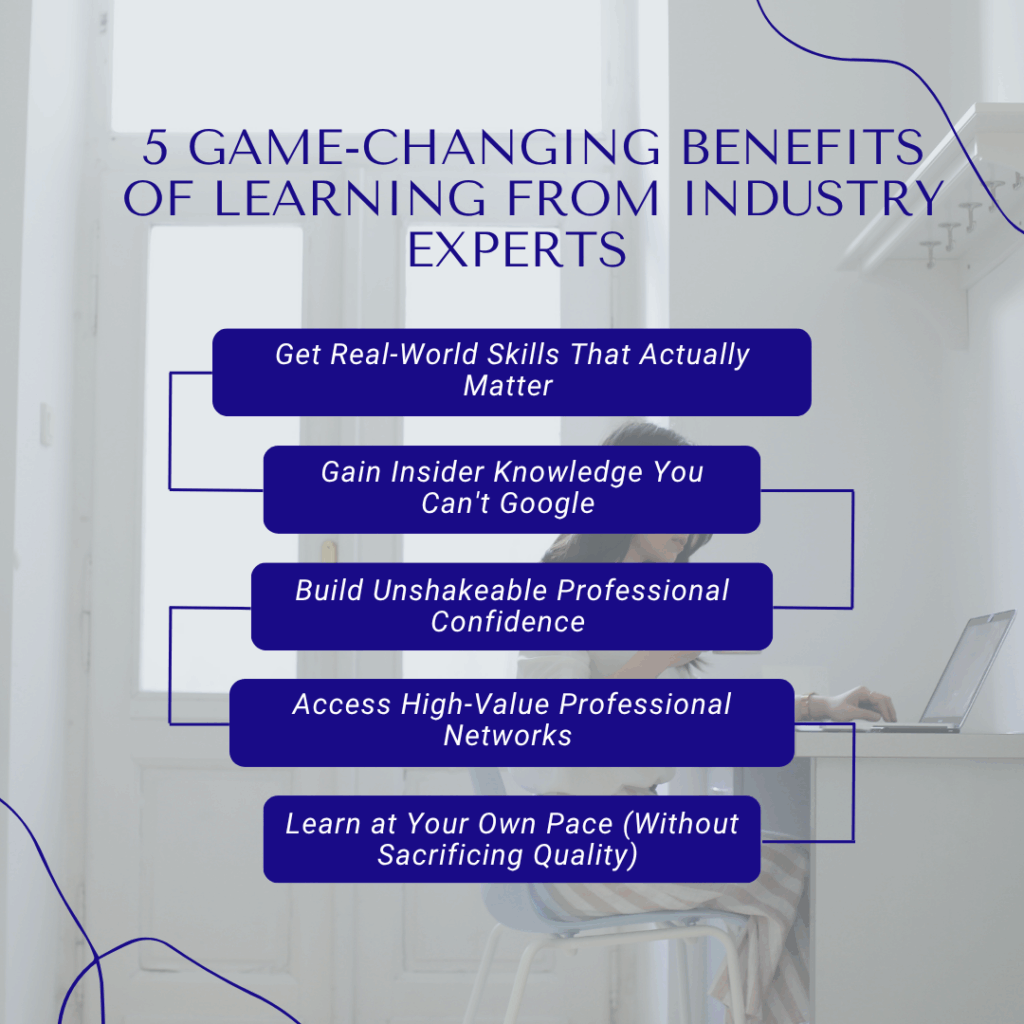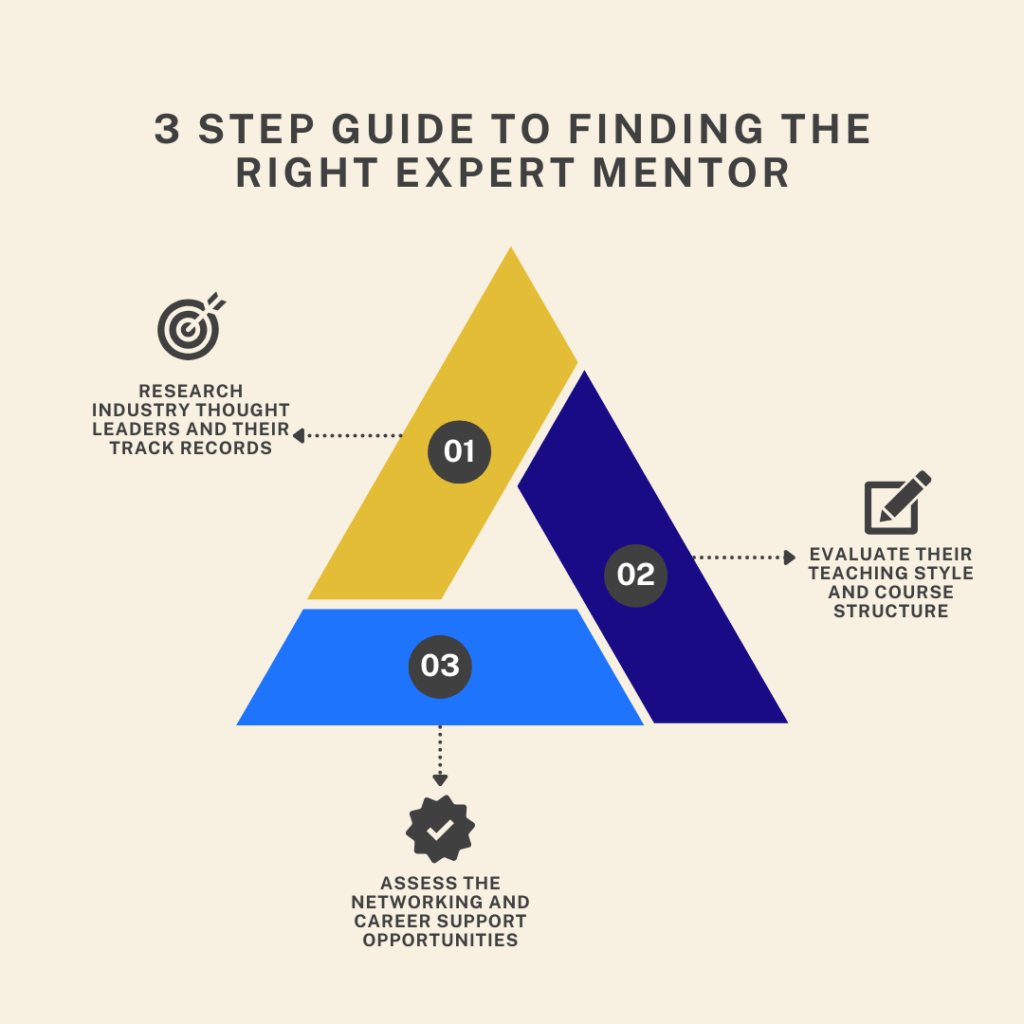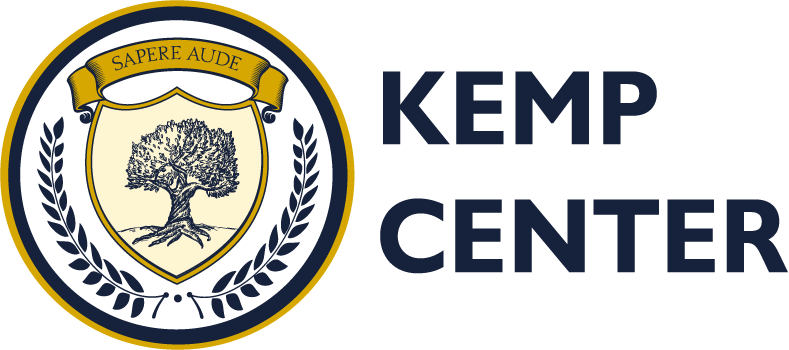Why Learning From Experts Is So Valuable?

Table of Contents
Do you ever feel like the invisible employee? You’ve been putting in long hours, meeting your targets, and even mentoring junior teammates. But once again, someone else gets the promotion. You are told you are a great employee and that you do great work, but you are always overlooked. Perhaps, you are starting to wonder what is really going on here? Is it luck, office politics, or something else that you are clearly missing.
Let me tell you a secret: professionals who actively learn from experts are up to 90% more likely to accelerate their careers. Why is this the case? Well, experts help you think like a leader, not just to perform like one. They can give you guidance on how to work smarter not harder. Their experience becomes your advantage—giving you the mindset, strategy, and real-world insight you won’t find in a textbook.
The Hidden Problem with Traditional Learning (That Nobody Talks About)
I’ve had the pleasure of working with many professionals over the years who have invested their valuable time and money into degrees, MBAs, and other certifications, only to find themselves poorly prepared for the workplace.
When you look at their profile on paper they did everything right, but they were missing that edge, that would move them forward in their career. The truth is, most traditional education is outdated. Academic institutions focus on theory, while forgetting the practical aspect. Professionals don’t gain real-time industry application and they also miss out on networking opportunities.
According to a recent study, over 70% of employees feel they lack the practical skills needed to succeed in their roles—even after formal education. This is the real gap and it should be filled with expert learning. It’s not a lack of effort—it’s a lack of access to the kind of learning that actually changes careers.
5 Game-Changing Benefits of Learning From Industry Experts

Get Real-World Skills That Actually Matter
Traditional learning teaches you facts, without teaching you how to put them into practice. This underlines the reason why learning from experts is a game changer. Let’s look at example: Let’s say you take a computer graphics course from a university. They will most likely teach you about cover shading algorithms. But only an industry expert will show you how those techniques are actually used in Pixar-level animation pipelines—and which shortcuts studios use to meet production deadlines.
Kassy LaBorie, a virtual training expert, put it best:
“The best way to learn something is from someone who’s doing it right now, not someone who did it 10 years ago.”
This will apply across all industries, not just graphic design. A graduate from medical school will learn anatomy from a textbook but will only learn how to operate on someone from a surgeon. The same holds true for a finance graduate, they will learn forecasting models, but only a CFO will show how to apply them under boardroom pressure.
Gain Insider Knowledge You Can’t Google
Industry knowledge runs deeper than anything you will ever get from a textbook, Google or even now AI. Learning from an expert you will gain unwritten rules, career strategies, and decision-making insights, from actual real-life experiences.
For example, seasoned UX leaders frequently instruct product designers on how to handle client politics, strike a balance between trade-offs under pressure, and steer clear of typical blunders that cause launches to fail. Additionally, months before they are reported in the mainstream media, they offer early warnings about emerging trends, such as the AI-driven change in user experience design.
By planning ahead you become invaluable to your team and you avoid the chaos that comes with just getting by.
Build Unshakeable Professional Confidence
Anyone can learn a skill but watching an expert master a skill will give you the realization that you can do the same. This helps you close the gap between where you are and where you want to be. It makes it seem more attainable and not just a pipedream.
You can eliminate imposter syndrome by learning on a mentorship basis. One professional I worked with told me, “After shadowing my mentor during real client calls, I stopped second-guessing myself. I finally felt like I belonged in the room.”
You build that confidence by being in the room, learning and actively participating. You will prove to yourself that you can do it by actually doing it and this will build your confidence. Knowledge and theory won’t give you the same confidence.
Access High-Value Professional Networks
When you learn from experts, often times you naturally have the opportunity to build a network and make important connections. You will obviously connect with your instructor but also with your peers. These peers may eventually become your collaborators, clients, or even future employers. When you get the opportunity to learn in expert environments, you are not upskilling, you are also plugged into a circle where you have access to opportunities.
Learn at Your Own Pace (Without Sacrificing Quality)
Flexibility is a huge plus when it comes to learning from experts. Expert learning platforms, like the one on Kemp Center, often allow you to learn on your schedule—without losing the structure, quality, or interaction that live classrooms offer.
A study from Harvard’s Graduate School of Education found that while students in traditional lectures felt like they were learning more, those in active, expert-led environments actually retained more and performed better on assessments. The researchers observed a “strong anticorrelation between feeling and actual learning”—proving that expert-driven formats quietly outperform passive classrooms, even when it doesn’t feel that way to the learner.

The Numbers Don’t Lie: Expert Learning Is Transforming Careers
Since the year 2023, the global e-learning market was valued at $263.5 billion, and it’s projected to skyrocket to $933.5 billion by 2032, growing at a compound annual growth rate (CAGR) of 14.8%, according to Allied Market Research. This explosive growth isn’t just about convenience—it’s being driven by results.
Any company that is leading with expert learning is seeing a real return in results. A report referencing an IBM study shows that for every $1 spent on online training, companies see $30 in productivity gains thanks to faster application of skills. This just further underlines why companies are spending more and more money on learning investments.
According to LinkedIn’s 2025 Workplace Learning Report, 78% of employees would work at a company longer if it provided transparent development pathways, also, as a recent eLearning Industry survey found, 75% of employees report more job satisfaction when they have engaging learning opportunities.
So, companies that want to reach the top should consider building a culture built around learning and professional development. Deloitte’s research indicates that organizations prioritizing continuous learning are 92% more likely to innovate and 46% more likely to be first to market.
Real Success Stories: How Expert Learning Changed Everything
Honestly, sometimes all it takes a single expert lead course to change the future of your career. I think if you asked Larry Richards, he would agree with that statement. In his 50s, Richards was a jazz pianist with no background in finance. But after enrolling in an online finance course taught by a seasoned trading expert, his life took a sharp turn.
He started his own financial startup in three years, sold it for a profit three years later, and took a position as CTO at a prominent Wall Street hedge fund. Richards later told reporters, “Learning from someone who’d actually traded on the floor gave me the clarity I never got from books.”
Stories like this aren’t as rare as they used to be. They’re part of a growing movement: professionals unlocking new careers by learning directly from those who’ve already walked the path—and succeeded.

Your Step-by-Step Guide to Finding the Right Expert Mentor
When you find the right expert mentor, it can save you months of your life that you could waste on a mediocre course. You can level up in your career faster than you ever thought possible.
In my years of evaluating expert lead courses, I’ve seen it firsthand that unfortunately not all instructors are created equal. The best instructors don’t just teach, they actually live it. They have seen it, built it, and done it. This is the best type of instructor to learn from. Here are three easy steps to help you find high quality experts to teach you.
Step 1: Research Industry Thought Leaders and Their Track Records
Before you sign up for any course make sure to do some digging. You want to check out who the instructor is and if they are actually known in the industry. Check various internet sources such as LinkedIn, GitHub, and industry forums, etc.
Also, look for real world accomplishments for example if they lead a team at well known company or published research,etc. Consider searching for interviews, podcasts, or articles that show their current industry involvement.
You want to avoid someone who is good at marketing and therefore, is visible online. If you can’t verify their experience in 15 minutes of research, move on. So, if there is no digital footprint or inflated testimonials without student outcome, chances are they are not ‘expert’.
Step 2: Evaluate Their Teaching Style and Course Structure
Someone can be an expert in their field, but that doesn’t mean they can pass on the knowledge. Not everyone is meant to be a teacher. A great mentor doesn’t just throw information at you. They guide you through applications and give real feedback.
Here is a checklist of things you can do, before enrolling in a course:
- Watch sample lessons or webinars to assess their clarity, pacing, and relevance
- Check if the course includes hands-on projects, case studies, or 1:1 feedback
- Ask about what outcomes you will walk away with, after completing this course
Two of the biggest red flags that should make you run for the hills when it comes to expert led courses:
- If a course is 100 percent pre-recorded and there is no opportunity to interact with the instructor or peers
- Buzzword-heavy curriculums without real-world examples
Think about it this way you want a course that will transform your career, as opposed to a course that will just throw information at you.
Step 3: Assess the Networking and Career Support Opportunities
The number one hidden value when learning from an expert is access to a network of experts and peers. This can also mean that there may be an opportunity for employment and career support.
Try to look for programs that have active communities, such as chats on Slack or forums on the learning platform. You can ask the instructor if they offer ongoing mentorship or Q&A sessions. Additionally, check if there is career support such as resume review, mock interviews, or employee partnerships.
Avoid courses that offer no post course engagement, or their discussion boards are dead. Also, don’t choose a program that doesn’t show their results and impact. A reputable program will be proud to show the metrics they have achieved with their students. If a course doesn’t share these things, there is chance that they don’t exist.
Frequently Asked Questions About Expert Learning
How much should I expect to invest in expert-led training?
Expert-led programs typically range from $500 to $5,000, depending on the length, depth, and level of mentorship included.
Honestly, if a course costs less than $100 and promises career transformation, be skeptical—you’re likely paying for pre-recorded content with little to no support.
How do I know if an expert instructor is legitimate?
Verify if you expert instructor is legitimate by looking for real world experience and results. A legitimate expert will have a clear professional history on LinkedIn or a personal website. Also, they will have worked at top companies, published research, patented products, etc. Finally, they will have public content whether it be podcasting interviews, conference talks, or articles that show their depth.
Can expert learning really help me change careers?
Absolutely, 100 percent yes. Various learners successfully transitioned roles within 6–12 months by developing applied portfolios, getting mentorship, and getting embedded in an image expert network.
For example, KEMP Center students have transitioned customer support to analytics, design to UX leadership, and music to finance, in many cases within 1–2 years.
What’s the difference between expert courses and traditional certification programs?
Traditional certification programs or even academic degrees are primarily focused on information and theory. Also, they focus on testing if you have memorized the information they have provided, as opposed to any real world application. Not to mention, the information packed into these courses, tends to be outdated.
When you learn from an expert, the course is built around:
- Real world projects and experiences
- Mentorship from practitioners
- Immediate application in a work setting
Honestly, learning from expert is like training for the job you want, not just another notch on your resume.
How long does it typically take to see career results from expert learning?
Most learners begin to see tangible outcomes—like a promotion, job interview, or new project—in 8 to 16 weeks.
However, if you are looking to make a full transition into a new industry (perhaps your career switching), this can take a little longer. It can between 6 to 12 months. This involves consistent application, networking, and portfolio building—faster than most traditional degrees or certifications.
Are online expert courses as effective as in-person training?
They are just as effective, if not more so, for working professionals. A 2024 Harvard Graduate School of Education study found that mentor-driven hybrid models led to higher engagement, stronger skill application, and better recall than passive classroom settings.
Not to mention that online learning offer more flexibility, access to global experts and an interactive feedback loop that mimic real-world environments. Honestly, the format doesn’t matter, it’s the instructor that is the golden ticket and how they teach.

Summary
Knowledge alone is no longer enough in today’s intense and competitive job market. The real transformation happens when you directly from those who’ve already achieved what you’re aiming for. Learning from an expert, you get a combination of mentorship, real-world relevance, and powerful networking to fast-track your success.
Let’s recap the groundbreaking benefits you gain by learning from an expert:
- You learn skills that can be applied in real-world settings. You are learning by doing, not just memorizing theory.
- Access hard-earned lessons and industry shortcuts, that cannot be Googled or even found via AI.
- You can learn from role models who have been where you are now. So, you can build your confidence that you can get there too.
- You can connect with mentors and peers who open doors.
- Also, you can learn at your own pace without having to sacrifice quality. These courses offer flexibility and focus that are a great solution for working professionals.
So, whether you are aiming for a promotion, career pivot or making your first break in the job world, the path forward is clearer when learning from an expert.
Explore our comprehensive courses at KEMP Center, where industry veterans share the exact strategies that transformed their careers — and can transform yours too.
